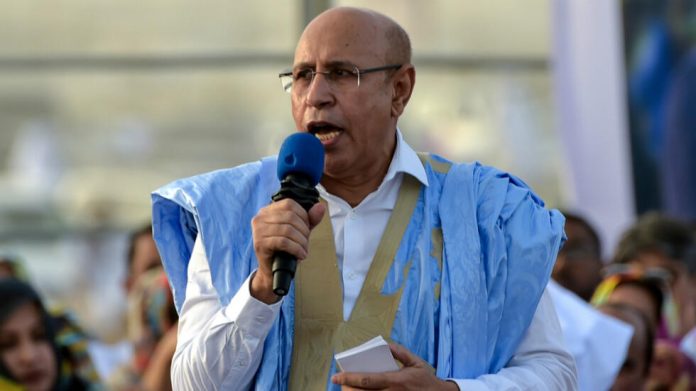Mauritania’s Independent Electoral Commission has today announced the completion of the vote counting process, with incumbent Mohamed Cheikh Ghazouani, who has ruled the northern African nation since 2019, receiving 56.12 percent of the national vote, ushering in another five years under Ghazouani and his El Insaf (Equity) party.
What You Need to Know
Participation in the country’s election was decidedly low, with just over half (55 percent) of the nations 4.7 million citizens heading to the polls on June 29th.
As expected, President Ghazouani secured for himself a second five-year term, with 56 percent of the vote, up four percent from the 52 percent he received in the 2019 Presidential elections.
Biram Dah Abeid, a prominent Haratin rights activist, gained 22.10 percent of the vote, up from the 18.7 received in 2019.
While Hamadi Mohamed Abdi (Hamadi Ould Sid’El Moctar), of the Tewassoul party, received 12.76 percent of the national vote, down six percent from the 18 percent Tewassoul received in the 2014 Presidential elections.
Other candidates, such as l’Espoir Mauritanie’s El Id M’Bareck (El Id Ould Mohameden) received 3.57 percent, while Mamadou Ba, an activist for Afro-Mauritanian rights under the Alliance for Justice/Movement for Renewal (AJD) party, received just 2.39 percent of the vote.
Independents Outouma Antoine Soumare and Mohamed Lemine El Wavi received approximately two percent and one percent, respectively.
So, What Now?
The election results have stirred up controversy, with Biram Dah Abeid rejecting the results while speaking at a press conference in Noukachott today.
Abeid has accused the ruling regime of ‘diverting voters to centers outside Nouakchott to control their votes.’ Abeid also claimed the nation’s Independent Electoral Commission has committed fraud, and according to local press Essirage, has called on Ghazouani to “Hand over power to the one chosen by the people. The army is not a king that you can do with as you wish, and I call on the officers not to participate in the coup against the administration of the citizens.”
In response, Mauritania’s Interior Minister, Ahmed Ould Mohamed Al-Amin, has accused Abeid supporters of being “racist movements known for their hostility to the homeland.”
Al-Amin claimed this evening that there had been incidents of “Mobs of supporters of one of the candidates [Abeid] trying to disrupt security, incite riots, and intimidate citizens.”
At the same time, the same media network, Essirage, claimed it had received information from ‘special sources’ that “The Mauritanian authorities suspected that elements supporting former President Mohamed Ould Abdel Aziz intended to carry out acts of sabotage in conjunction with the Presidential elections.”
According to the unnamed sources, there was a “discovery of coordination between them [Aziz supporters] and elements affiliated with the Movement for the Liberation of Mauritanian Negroes (FLAM).
The intel led to the arrest of two men who served as Ministers under former President Aziz, Sidna Ali Ould Mohamed Khouna and Mohamed Ould Jibril.
As previously reported, in 1983, Mauritania’s afro-Mauritanian population, who had faced discrimination from the ruling ‘white moor’/Bidan population, had begun organizing under the ‘Forces de Liberation Africaines en Mauritanie’ (FLAM), with afro-Mauritanian military personnel linked to FLAM attempting to overthrow President Maaouya Ould Sid’Ahmed Taya in 1987, who had taken power through a coup of his own in December 1984. The coup failed and prompted the Taya regime, in 1989, to begin the expulsion of 80,000 Afro-Mauritanians to Senegal and Mali. Hundreds were killed or removed from their positions in the civil and military service.
By 1991, Taya had removed much of what he believed was the FLAM leadership from the areas surrounding the Senegal River. Only between 2008-2012 did many of the expelled Afro-Mauritanians return to Mauritania under UN guidance, although many of them have struggled to regain their previously owned land and access to full citizenship.
The attempt to conflate Aziz supporters and FLAM members is likely a calculated move by the El Insaf/Ghazouani regime to ‘kill two birds with one stone’ and remove as much of his opposition as possible under the guise of protecting ‘national security.’
Abeid’s speech against the results and the Interior Minister’s claim that Abeid supporters had incited violence is likely another attempt to connect Abeid and his party to violent acts in order to discredit Abeid’s claims and repress his supporters.
Although there was no doubt that Ghazouani was set to win a second term, there were questions around how, once he had secured his position, he would deal with the opposition.
The coming days are vital for Mauritania, as if Ghazouani moves too hard and too fast to remove his opponents from positions of power, the security apparatus may step in and ‘check’ Ghazouani, to make sure he understands that keeping his role requires the support of the military.
However, Ghazouani’s re-election does ensure policy continuation, as the President is seen as somewhat of an ‘ally’ of the West. Particularly, as Ghazouni has made major purchases of military equipment and weapons in recent weeks to bolster his forces and ensure elements of Russia’s Wagner group and the Malian Army (FAMA) do not continue to encroach on Mauritanian territory in their pursuit of Islamic Militants and Tuareg rebels.

